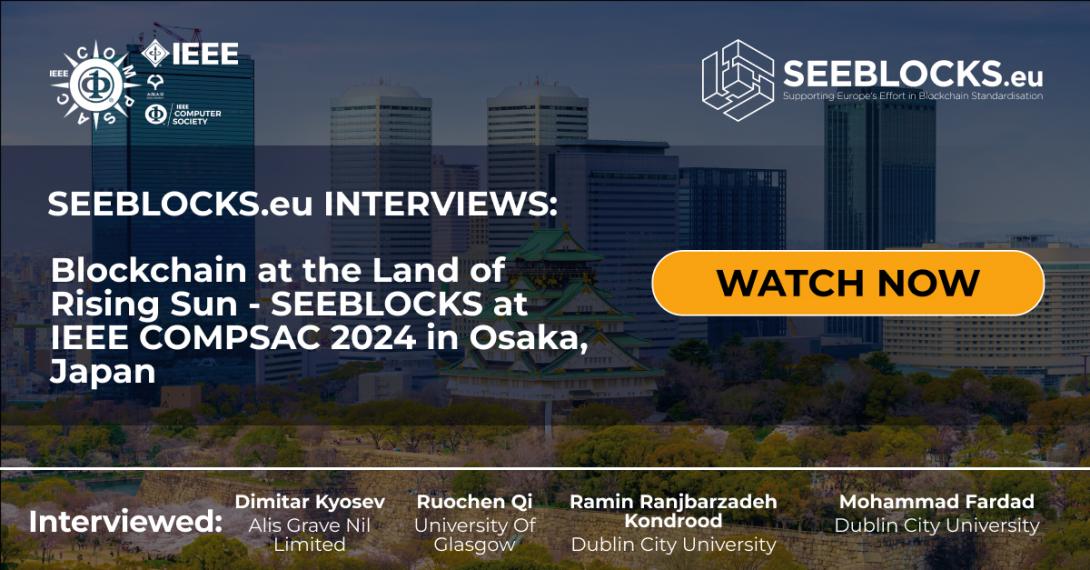Blockchain at the Land of Rising Sun - SEEBLOCKS at IEEE COMPSAC 2024 in Osaka, Japan
28 January 2025

SEEBLOCKS.eu exploited the opportunities provided by Computers, Software, and Applications Conference (COMPSAC), one of the oldest and most prestigious events of the International Society of Electrical and Electronics Engineers (IEEE), where its the 48th annual conference was held in July in Osaka, Japan, with nearly 500 attendees.
SEEBLOCKS.eu organised a COMPSAC satellite workshop, entitled “Blockchain Nexus: Bridging Innovations and Standards for Tomorrow’s Digital Frontier” for sharing the latest developments in blockchain/DLT technologies and standardisation. The workshop featured the presentation of four peer-reviewed papers presenting original relevant research on blockchain, showcasing to an Japanese and worldwide audience some of the latest blockchain innovations being made in Europe.
Four papers on European Blockchain Research, from standardisation to digital societies
Ramin Ranjbarzadeh (from Dublin City University) presented a novel use case for achieving secure and decentralised collaboration in oncology. A blockchain approach to the management of tumour segmentation is described, which preserves compliance to the onerous requirements for security and privacy in the medical sector while enabling the collaboration that is essential in this area.
Elham Mohammadzadeh Mianji (with support of Mohammad Fardad), also from Dubliin City University, presented an original research carried out in the context of SEEBLOCKS.eu, where it is proposed a novel hybrid consensus network scheme designed to enhance the integration of permissioned distributed ledgers within the Internet of Vehicles.
From there we moved on to presentations that directly addressed standardisation-related issues. Dimitar Kyosevm (from ALIS GRAVE NIL LIMITED) presented his paper which addressed the issue of compliance to voluntary standards, a key concept in facilitating the uptake of new technologies. Resource-poor SMEs have a particularly hard time with the costs of implementation of standards, not to mention the costs of verifying compliance. This paper proposed a novel blockchain/DLT-based approach to facilitating standards compliance.
The final paper, presented by Ruochen Qi from University of Glasgow, addressed the topic of geopolitical manoeuvring in blockchain standardisation. The presentation noted the continued dominance of the U.S. in this field, driven by its focus on technological intricacies and institutional support, notably from NIST (National Institute of Standards and Technology). Conversely, the EU's approach begins with reliance on ISO standards, potentially resulting in fragmented standardisation and limited proprietary blockchain development. However, initiatives like SEEBLOCKS are contributing to addressing these issues. Moreover, the introduction of EURC as a competitor to USD-pegged stablecoins illustrates the EU's strategy to challenge U.S. technological dominance, facilitated by initiatives like Markets in Crypto-Assets Regulation (MiCA).
Transatlantic Digital Prosperity and Standardisation Impacts - next SEEBLOCKS.eu events
To keep showcasing the work European experts are doing in Blockchain Standardisation, while aligning the standardisation needs across the globe, SEEBLOCKS.eu is organising the following events this 2025:
- 21st March 2025 (New Orleans, USA): SEEBLOCKS.eu is organising at SES Conference 2025 the workshop “Blockchain - A Transformative Power for a Transatlantic Digital Posterity”, to brainstorm what are the most urgent and emerging standardisation needs on blockchain between USA and Europe trading territories, without losing the global digital perspective. Join us in New Orleans, register to SES Conference 2025 now.
- 10th April 2025 (Brussels, Belgium): the 1-day event “How the DEP project SEEBLOCKS.eu has impacted European Blockchain/DLT Standardisation” will demonstrate how SEEBLOCKS.eu accelerated blockchain standardisation, through dedicated financial support to European experts working diligently in this field, and how blockchain and DLT can serve society as relevant technology enablers. Join us in Brussels and network with experts on blockchain across Europe. Save your seat in Brussels, register now!
SUBSCRIBE TO SEEBLOCKS.eu NEWSLETTER TO RECEIVE NOTIFICATIONS ON BOTH EVENTS